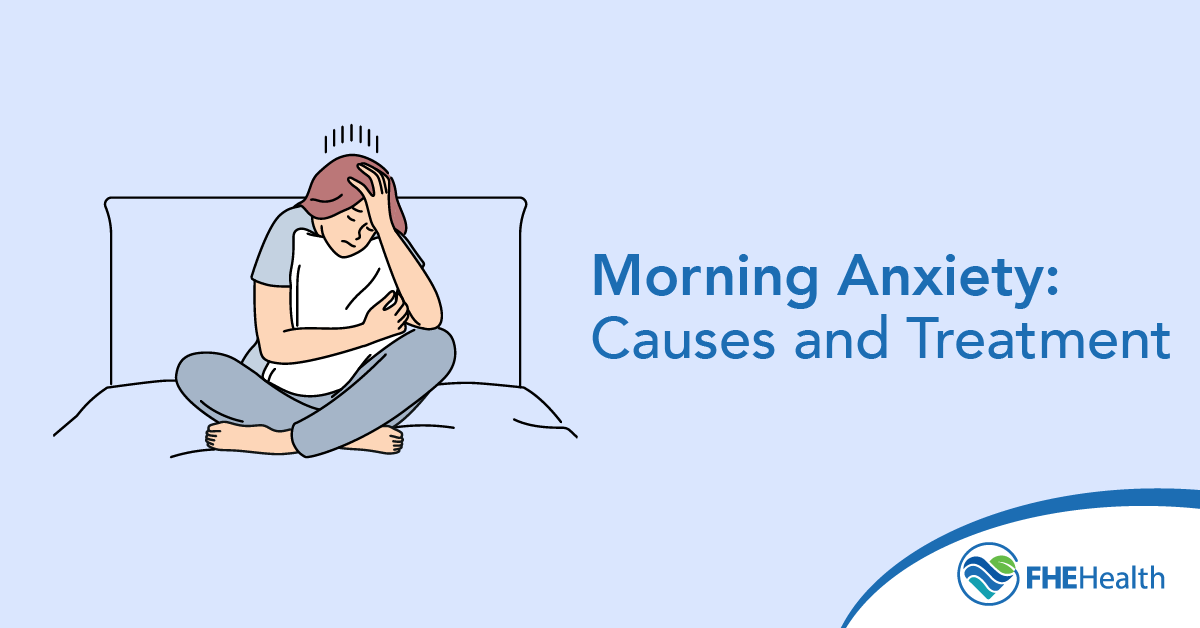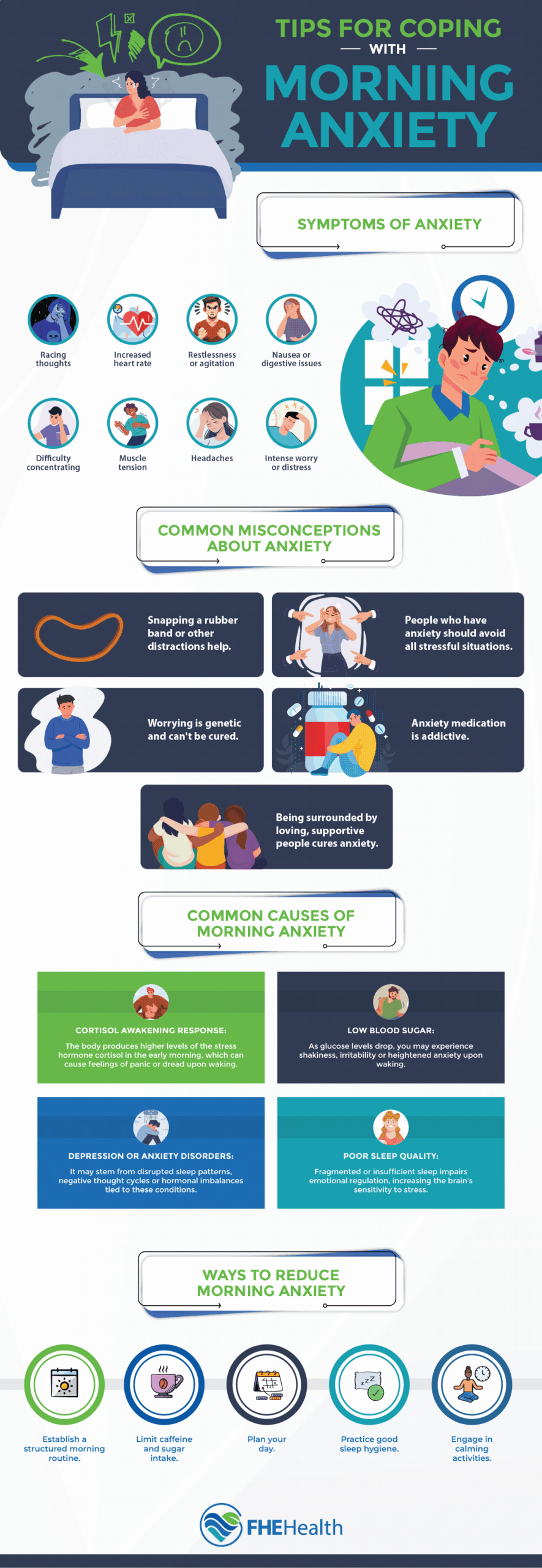
Do you wake up already worried about the day ahead? If your heart races, your breathing quickens and you feel a sense of dread before you get out of bed, you may be struggling with morning anxiety. Waking up with anxiety can make navigating daily life difficult. In some instances, it may also indicate an anxiety disorder.
Understanding the underlying cause of your anxiety can help identify appropriate treatment options to overcome it. This article explores common causes of morning anxiety. It also offers advice on how to break the cycle and build a more fulfilling life.
What Is Morning Anxiety?
Morning anxiety involves waking up with intense feelings of stress, nervousness or unease. It often hits shortly after awakening, making starting the day difficult. Although morning anxiety is usually linked to anxiety disorders or depression, it can also occur if you’re experiencing chronic stress, major life changes or poor sleep. Common symptoms include:
- Racing thoughts
- Increased heart rate
- Restlessness or agitation
- Nausea or digestive issues
- Difficulty concentrating
- Muscle tension
- Headaches
- Intense worry or distress
In severe cases, individuals may experience anxiety attacks. Signs to look for include hyperventilation, rapid heartbeat, trembling or shaking, dizziness and tingling in the fingers or toes.

How Morning Anxiety Differs From General Anxiety
Morning anxiety differs from general anxiety in its timing and intensity. While general anxiety can occur at any time, people with morning anxiety wake up feeling overwhelmed before the day even begins. In contrast, general anxiety may be more situational, occurring in response to certain triggers.
Morning anxiety is sometimes a symptom of an anxiety disorder, but not always. Generalized anxiety disorder is a diagnosable condition involving excessive, uncontrollable worry about various aspects of life. It’s one of the most common anxiety disorders, affecting up to 20% of American adults each year.
Waking Up With Anxiety: Common Causes and Biological Factors
A combination of biological, psychological and lifestyle-related factors can influence morning anxiety. Understanding the causes is key to managing symptoms effectively. Common biological contributors include:
- Cortisol awakening response. The body produces higher levels of the stress hormone cortisol in the early morning. For those prone to anxiety, this spike can cause feelings of panic or dread upon waking.
- Low blood sugar. If you skip meals or have irregular eating patterns, low blood sugar can trigger anxiety or panic-like symptoms. As glucose levels drop, you may experience shakiness, irritability or heightened anxiety upon waking.
- Depression or anxiety disorders. Morning anxiety can occur with generalized anxiety disorder, panic disorders or depression. This may stem from disrupted sleep patterns, negative thought cycles or hormonal imbalances tied to these conditions.
- Poor sleep quality. Fragmented or insufficient sleep impairs emotional regulation, increasing the brain’s sensitivity to stress. If you wake unrested, you may experience heightened feelings of fear or dread throughout the morning.
Contributing Patterns and Lifestyle Factors
In addition to biological factors, certain daily habits and long-term stress patterns can cause or exacerbate morning anxiety. These include:
- Chronic stress. Ongoing emotional or environmental stress can build over time, causing heightened feelings of morning anxiety. Common stressors include job pressure, changes in living arrangements, the loss of a loved one and traumatic events.
- Negative morning routine. Starting the day in a chaotic or unstructured way can increase feelings of dread and overwhelm. For example, skipping breakfast, running late or failing to plan your day can all spike your anxiety levels.
- Caffeine and sugar intake. Consuming large amounts of caffeine or sugary foods, especially in the morning on an empty stomach, can increase your heart rate or cause shakiness. These effects can mimic or worsen anxiety symptoms.
- Substance abuse or withdrawal. The use of alcohol, recreational drugs or certain prescription medications may affect your sleep quality or brain chemistry, causing anxiety upon waking. Withdrawal symptoms can include anxiety, irritability or shakiness.
How to Break the Cycle of Morning Anxiety: Treatment Options and Coping Strategies
Waking up with anxiety can be difficult, but it’s possible to overcome it by receiving professional treatment and learning new coping strategies. While your anxiety won’t disappear overnight, the following approaches can help reduce your symptoms and improve your quality of life.
Treatment Options
Professional treatment can provide long-term support for persistent or severe morning anxiety. Common treatment methods include:
- Cognitive behavioral therapy. This structured therapy can help you identify and manage negative thought patterns contributing to your anxiety. You can then learn how to challenge these thoughts and build healthier habits.
- Medication. Antidepressant or antianxiety medications can help balance brain chemistry and reduce your symptoms, especially if anxiety interferes with your daily functioning.
- Support groups. Connecting with others who experience morning anxiety can provide a sense of community and a source of advice for building coping strategies.
Coping Strategies
Along with treatment, changing your daily habits can play a vital role in managing anxiety. This may involve adjusting your lifestyle or learning new hobbies to help calm your mind. Strategies to consider include:
- Establishing a structured morning routine. A predictable routine creates a calm, focused start to the day. Try waking at the same time each morning, eating a balanced breakfast and performing a light exercise or stretching routine.
- Limiting caffeine and sugar intake. Caffeine and sugar consumption can worsen anxiety symptoms. Choose low-caffeine beverages and protein-rich foods in the morning to stabilize mood and boost energy.
- Planning your day. Writing down daily tasks or establishing priorities in the morning can help set expectations for the day, reducing stress and anxiety.
- Practicing good sleep hygiene. A restful night sets the tone for a better morning. Create a calming nighttime routine and maintain a regular sleep schedule to improve sleep quality. Avoiding screens before bed can also help.
- Engaging in calming activities. If you wake up feeling anxious, try deep breathing, meditating or listening to music. These calming activities can promote emotional balance, improving mood.
Seek Professional Help With FHE Health
If your morning anxiety is persistent, disrupts your sleep or interferes with your ability to function, professional support is available at FHE Health. We offer a variety of treatment options for anxiety to help you get your life back on track. Contact us today to speak with a counselor and discuss your next steps.






